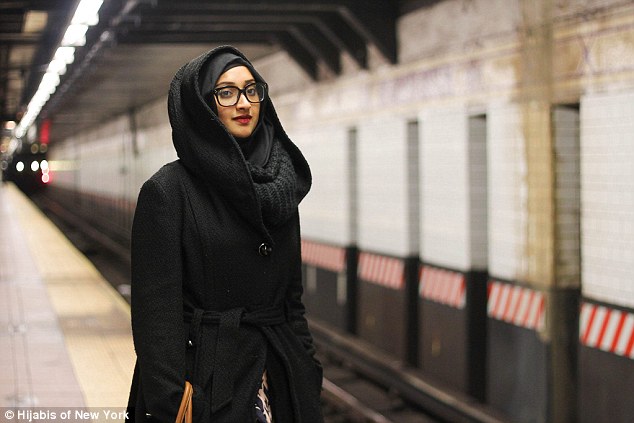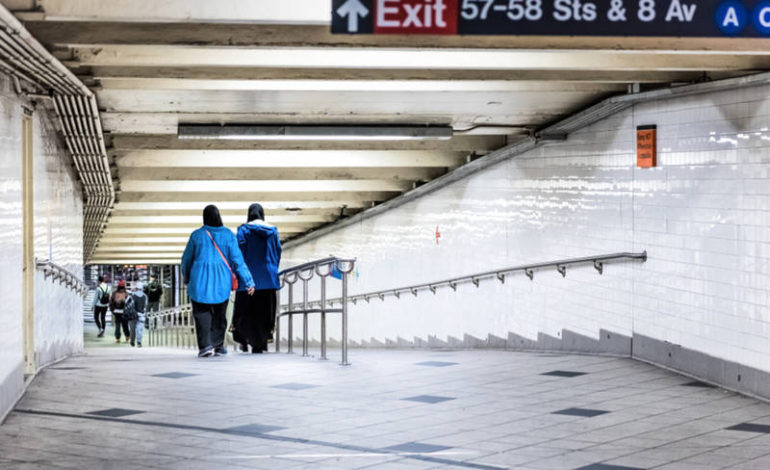NEW YORK — More than a quarter of hijabi Muslim or Arab-looking women were shoved on the subways as xenophobic attacks proliferated in New York City around and following the 2016 presidential election, a new report says.
More than 27 percent of Muslim women who wear the hijab, a religious head covering, said they were intentionally pushed or shoved on a subway platform at some point between July 2016 and late 2017, according to the city Commission on Human Rights report released on Tuesday.
The finding came in a new survey on discrimination, harassment and violence against New Yorkers
More than 38 percent of the Muslim, Arab, Sikh, Jewish and South Asian New Yorkers the commission surveyed were verbally harassed, about 9 percent were physically assaulted and more than 16 percent experienced job discrimination in that period. But more than 70 percent did not report what happened to them.
“The data from this survey is an invaluable tool that will help the Commission and other stakeholders better address and prevent these incidents and ensure that people know where to go to get help,” Carmela P. Malalis, the commission’s chair, said in a statement.

A young woman pictured on a New York City subway platform.
The extensive survey of more than 3,100 people documents how frequently New Yorkers were attacked based on their race and religion around the time President Trump was elected on what some saw as a xenophobic platform.
26.6 percent of people surveyed said they experienced harassment, taunts or threats based on their religion, race or ethnicity more than once
One in four people surveyed — 26.6 percent — said they experienced harassment, taunts or threats based on their religion, race or ethnicity more than once.
About one in seven — 13.9 percent — said they were denied service at a business because of their identity. That problem was more common among Muslims and Sikhs, especially Sikhs who wear turbans, the survey shows.
Certain groups faced a particularly high risk of harassment, violence and discrimination, the report says. Sikh people younger than 35 were twice as likely as others in the survey to face verbal harassment. And nearly half of people who wear religious garments experienced harassment, compared with 34 percent of those who don’t.
Some 19.4 of Black, mostly Muslim, women in the Bronx said they experienced physical assault; more than twice the rate of all those surveyed, the report says.
The attacks can hurt victims’ mental health — more than half of people who said they were unfairly fired and more than a third who were assaulted “screened positive for probable depression,” the report says.
The frequent harassment and violence tracks with a sustained spike in hate crimes reported to the NYPD in 2016 and 2017.
The Commission on Human Rights report recommends creating a network of community and faith-based groups to educate targeted people about their rights and training city employees on how to de-escalate bias incidents.
The city should also use its ThriveNYC mental health initiative to support New Yorkers who have experienced bias, the report says.
KEY FINDINGS:
- Nearly two in five (38.7 percent) survey respondents reported experiencing verbal harassment, one in 10 (8.8 percent) reported being the victim of physical assault, and nearly one in six (16.6 percent) said they experienced some form of racial, religious or ethnic discrimination-related problem in their employment in either a current job or while seeking a job.
- One in four (27 percent) Muslim Arab women who wear a hijab reported being intentionally pushed or shoved on a subway platform.
- Sikh New Yorkers under the age of 35 have nearly twice the chance of experiencing verbal harassment than other survey respondents.
- 80 percent of Jewish survey respondents said they were “very” or “somewhat” bothered by anti-Semitic vandalism or property damage.
- One in five (19 percent) South Asian survey respondents said they had experienced employment discrimination.
- Overall, nearly 71 percent of survey respondents said they did not report bias incidents to a community-based organization, a faith-based organization, NYCCHR or the NYPD, citing concerns their reports would not be taken seriously, fear of retaliation and because previous reporting did not result in action.






Leave a Reply